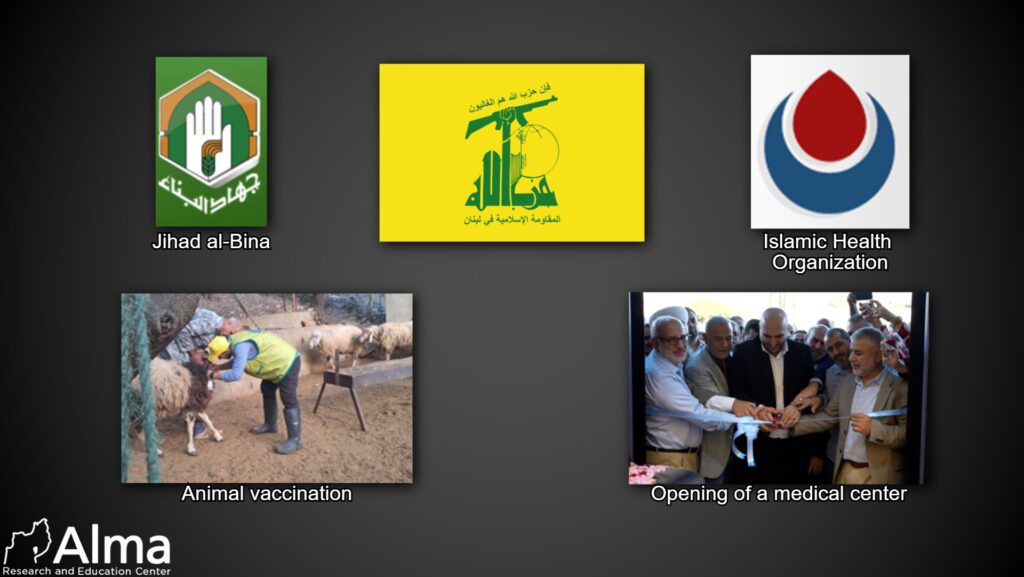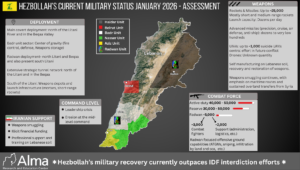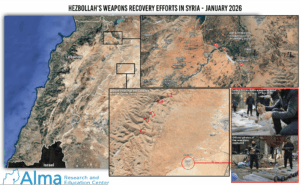Hezbollah’s civilian reconstruction is no less essential, and perhaps even more so, for the organization than its military rehabilitation. In order to rebuild militarily, Hezbollah relies on its civilian base, since the military and civilian reconstruction efforts are intertwined: civilian and economic infrastructures serve as both a foundation and a cover for military recovery.
In recent months, alongside its military rebuilding efforts, Hezbollah has also been intensifying its civilian activity, working to provide its supporters with services that the Lebanese government struggles to supply, including healthcare and even assistance to farmers through veterinary services. The organization is seeking to strengthen its influence over its Shiite base and to deepen that base’s dependence on Hezbollah, especially in light of the upcoming parliamentary elections in Lebanon (May 2026).
Hezbollah aims to preserve and even enhance its political power in Lebanon, which would allow it to maintain its position at the center of the political landscape and make it harder for the government to act against it, if and when the time comes. The group’s civilian activity is an important component of its overall reconstruction process, as well as of its election campaign and its efforts to secure the votes of its supporters. Political and social events such as the Al- Raouché Rock crisis in September 2025 are likewise intended to reinforce Hezbollah’s standing vis-à-vis the government in the eyes of its supporters.
The Executive Council is responsible for Hezbollah’s civilian activity. It operates two main organizations: Jihad al-Bina, the equivalent of a governmental housing or infrastructure ministry and the Islamic Health Organization, which functions as the counterpart of the national Ministry of Health. The Executive Council’s organizations operate alongside Lebanon’s official government ministries and, in practice, serve as effective substitutes for them in meeting citizens’ needs.
Jihad al-Bina formally serves as Hezbollah’s construction arm both within Lebanon and beyond. Its purpose is to build civilian infrastructure and to oversee “the Jihad of Agriculture” which implements agricultural projects such as tree planting, animal husbandry, and field irrigation systems.
The Islamic Health Organization provides ongoing medical services and emergency aid in fields related to civil defense (rescue, evacuation, relief, etc.), as well as training programs. It operates dozens of medical centers, including hospitals, clinics, and pharmacies in Shiite areas. In practice, it is the primary healthcare provider for Lebanon’s Shiite population.
Despite their civilian cover and missions, both organizations are fully involved in Hezbollah’s military activity, including serving as the “medical corps” for its armed operations and in building Hezbollah’s various military infrastructures.
In this manner, Hezbollah effectively becomes a state within a state, a reality that poses a direct threat to the authority of Lebanon’s government and its ability to enforce sovereignty across the country. U.S. envoy Tom Barrack recently expressed this point clearly, noting that Lebanon is a failed state, while Hezbollah, under Iran’s sponsorship, functions as the real state, providing citizens with what the government cannot (see Barrack comments)
For example, Health Minister Rakan Nasser al-Din, considered Hezbollah’s representative in the Lebanese government, is an integral part of the organization’s network of influence within state institutions. Hezbollah operates the Islamic Health Organization as an ostensibly civilian arm, but in practice it serves as a key instrument for deepening the group’s hold over the Shiite population and reinforcing its image as the “defender of society.” Through this body which has already established dozens of medical centers in Lebanon’s periphery, particularly in the South and the Beqaa Valley the organization uses the healthcare system to promote its “resistance” narrative and to cultivate public dependence on its services. In doing so, Hezbollah successfully combines social and medical activity with ideological propaganda, strengthening its public standing while bypassing Lebanon’s weak state institutions.
Over the past week, several events have been held under the leadership of these two organizations as part of Hezbollah’s civilian reconstruction efforts:
Hezbollah, through Jihad al-Bina, launches a livestock vaccination campaign in Lebanon
On October 30, the Jihad al-Bina organization launched a campaign to vaccinate livestock in villages and towns in the Mount Lebanon and northern regions, including the Jbeil area and the Jbeil Valley. According to Muhammad Jawad al-Husseini, deputy director of the organization’s regional branch, the purpose of the campaign is to prevent deadly intestinal diseases affecting local herds. Farmers and shepherds expressed gratitude to the organization for its assistance, especially given Lebanon’s severe economic crisis.
Free Health Day marking “Al-Aqsa Flood” as part of Hezbollah’s social propaganda campaign
On November 1, Hezbollah’s Islamic Health Organization marked the anniversary of the “Al-Aqsa Flood” and the “Uli al-Baas” battle by holding a free health day in the Jalil refugee camp in Baalbek, in the city of Sidon, and in other locations across Lebanon. As part of the initiative, organized in cooperation with the “Committee for Support of the Resistance in Palestine” and the “Work Committees in the Camps,” more than one hundred people received free medical treatment and checkups, hundreds of medications were distributed, and medical consultations and health workshops were provided.
Although the event was presented as a humanitarian initiative, it also served as a platform for demonstrating solidarity with the Palestinians and for reinforcing Hezbollah’s narrative as the defender of the Palestinian “resistance,” thereby deepening its influence within the social fabric of Lebanon’s refugee camps.
Opening of a new medical center in the town of Ghazieh, southern Lebanon
On November 2, a festive ceremony was held to inaugurate the Imam Reza Medical Center in the town of Ghazieh, southern Lebanon, under the patronage of Lebanese Health Minister Rakan Nasser al-Din. This is the 65th center established by the Islamic Health organization. The facility spans a large area and includes 42 doctors in 18 specialties, a laboratory, a pharmacy, an imaging institute, and advanced cardiology testing services. The ceremony was attended by political and religious figures, including Mohammad Raad (head of the “Resistance Bloc” in parliament), local officials, and members of the public. During the event, it was noted that the cornerstone had previously been laid by Hashem Safi al-Din, and that the center embodies the organization’s flagship motto in the social services field: “Serving the noblest of people.”
In conclusion, focusing solely on weakening or dismantling Hezbollah’s military capabilities is insufficient. The organization must also be weakened socially, economically, and politically. Hezbollah’s civilian power structure must be dismantled as well by providing essential services to citizens and breaking the Shiite base’s dependence on the organization for all its needs. Without the support of its base, Hezbollah will struggle to function, paving the way for its overall weakening and marginalization.







One Response
Dear Dr Zoe,
The Hezbollah cancerous da’wa infestation and all terrorist infrastructure must be totally removed befor any Lebanese healthy government can emerge. Do you think Germany would have recovered if Hitler’s SS death squads and the genocidal death camps were left to operate after WWII?